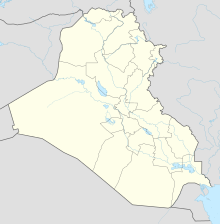Sinjar attack
Coordinates: 36 ° 19 ′ N , 41 ° 52 ′ E
The attack in Sinjar occurred on 14. August 2007 in the two Iraqi villages al-Qahtaniyah (Til Ezer) and al-Jazirah (Siba Sheikh Khidir) in the district Sinjar the province Ninawa and was directed against the ethnic group of the Yazidis . 796 people were killed and 1,500 more injured in four explosions. The terrorist attack with the most serious consequences and the most victims in Iraqi history to date is attributed to al-Qaeda .
prehistory
The Yazidis make up an estimated 1% of the Iraqi population and are an independent, non-Islamic religious community whose origins are controversial. They are considered unbelievers and are pejoratively (pejoratively) referred to as "devil worshipers". In addition, Yazidis are more likely to be victims of attacks and discrimination, as they do not have their own militias or political parties to support them. On April 22, 2007, the worst attack on Yazidis in Ninawa since 2003 occurred: 23 Yazidis were brutally murdered on the way home from their work in Mosul . The victims had been taken from a bus, whereby Christians and Muslims present were specifically spared. The act is considered an act of revenge for the murder of the 17-year-old Yezidi girl Du'a Khalil Aswad 15 days earlier, who was stoned by her own clan - allegedly for converting to Islam. Al-Qaeda in Mosul also issued a fatwa forbidding food to be given to the Yazidis, which led to a dramatic deterioration in the food supply in the Yazidi villages. The terrorists lured victims to their attack on the pretext of delivering food.
attack
On Tuesday, August 14, 2007 in the early evening hours, a truck loaded with explosives and two cars that had been converted into car bombs drove into the village of Qahtaniyya. The suicide bomber at the wheel of the truck pretended to be transporting food and thus attracted countless people. In front of a bus station, the driver finally detonated his explosive charge, which caused severe damage within a radius of 1 km². When rescue workers and lay helpers went to the scene of the accident, the other two assassins raced into the crowd and set off their car bombs, which led to further destruction and casualties. Around the same time, a suicide bomber blew himself up in nearby Jazira using a car bomb. Subsequently, several mortar shells fired from ambush hit the attack sites. Around 2,500 buildings in the two villages were destroyed or damaged, 796 people were killed and 1,562 others injured. After the attack, US troops participated in the relief work and clean-up work. The injured were flown to nearby hospitals in US helicopters.
Reactions
Iraqi Prime Minister Nuri al-Maliki , the commander of US troops in Iraq, General David Petraeus , the American ambassador to Iraq, Ryan Crocker and the Arab League strongly condemned the attack.
Extensive emergency humanitarian aid was provided in response to the attacks and the requirements resulting from them. Based on its assessment of the humanitarian situation on the ground, the International Committee of the Red Cross (ICRC), with financial support from the European Commission's Humanitarian Aid Service (ECHO) , the Iraqi Red Crescent and some non-governmental organizations (NGOs), provided the necessary emergency aid: two war wounded medical teams and equipment for hospitals, US $ 10,000 drug donations , non-food aid to 800 families, 1,400 food packages, 500 boxes of canned food, 5 tons of rice, trucked water and small amounts of cash were promptly distributed to those in need.
In response to the attack, more than 400 additional police forces were deployed in the region. The European Commission condemned the attack and provided emergency humanitarian aid.
Al-Qaeda leader Abu Mohammed al-Afri , believed to be the initiator of the attack , was killed on September 3, 2007 in a US air strike about 70 miles southwest of Mosul.
See also
Individual evidence
- ↑ WIELAND SCHNEIDER: Iraq: Yazidis fear their "extermination" after attacks - Die Presse, August 16, 2007
- ↑ ( page no longer available , search in web archives )
- ↑ Ferrero-Waldner: P-4381/2007 - Answer of October 10, 2007 on behalf of the Commission to Parliamentary Question

